The kind of world we’re living in right now is changing so fast. Think about it, our parents often talk about a time when life was slower, routines were simpler, and people had more time to pause and reflect.
But for us, life feels like an endless race to keep up. Work deadlines, social commitments, and digital distractions constantly pull us in different directions.
In this technologically advanced and fast-paced world, all of us need a toolkit that can support our overall health and well-being and keep us sane.
Meditation, journaling, self-care, etc. are all part of that toolkit.
Our minds are occupied most of the time and feel like a whirlwind of thoughts, scattered to-do lists, emotions you can’t pin down, or ideas waiting to be sorted.
This is exactly where meditation and journaling come in because both of them are very effective in calming your mind, getting clarity on thoughts, ideas, and emotions, and improving your mental health and well-being.
But if you’re confused if you should meditate before journaling or vice versa, you’re not alone. It’s a common question for people who are exploring these practices.
Well, the short answer is yes, meditation before journaling will calm your mind and improve the entire experience.
When you sit down to journal after meditating, your thoughts flow more freely, your focus sharpens, and your entries become more meaningful and insightful.
It’s like preparing the soil before planting a seed—meditation sets the stage for a productive and intentional journaling session.

In this blog, we’ll explore why meditating before journaling might be the best way to approach these practices.
We’ll also dive into questions like how these practices complement each other and the benefits of combining them in your routine.
Of course, everyone’s preferences and routines are different. Some people may feel more inspired to journal first and meditate afterward, while others might find a completely different rhythm.
This blog isn’t here to tell you there’s only one right way. Instead, it’s about helping you understand why meditating before journaling might be worth a try, so you can experiment and see what works for you.
Let’s get started.
Table of Contents
Is It Better to Meditate or Journal First?
When it comes to deciding whether to meditate or journal first, it really depends on what you’re looking to achieve. Both practices have their own benefits, and the order can make a difference depending on your goals.
So, is it better to meditate or journal first? Let’s break it down.
Meditating first can help you start with a clear and calm mind. If your thoughts feel jumbled or overwhelming, meditation acts like a mental detox because it helps you focus on the present moment.
By the time you start journaling, you’ll be more in tune with your emotions and able to write with clarity and purpose. It’s a great option if you’re someone who struggles to organize your thoughts or feels easily distracted when writing.
If, however, you feel a strong need to “brain dump” all your thoughts and emotions onto paper, journaling first may be helpful.
By writing everything down, you can release pent-up feelings or clear your mental clutter. Once your mind feels less chaotic, meditation can then become an even more peaceful and grounding experience.
Journaling first might work well for those who feel restless or have a lot on their minds when they sit down to meditate.
Ultimately, there’s no right or wrong answer, what’s better depends on how these practices fit into your life. If you’re unsure, try experimenting.
Meditate first one day and journal first the next, and see which feels more natural. Many people find that meditating before journaling creates a smoother flow because you’re starting from a place of calm, but the key is finding what works for you.
Whichever order you choose, the important thing is that both practices are helping you reconnect with yourself and create space for mindfulness in your day.
What Are the Benefits of Meditating Before Journaling?
There are so many benefits to meditating before journaling. When you pause to meditate first, you’re essentially preparing your mind and emotions for deeper and more meaningful reflection.
Let’s take a deeper look into why meditating before journaling can be such a powerful combination.
One of the primary benefits of meditating before journaling is mental clarity. Meditation helps quiet the mental chatter that often clouds our thoughts.
When you start journaling afterward, your thoughts are more focused, and your writing becomes less scattered and more intentional.
Meditating before journaling can also help you connect more deeply with your emotions. During meditation, you become more aware of how you’re feeling in the moment, whether it’s stress, gratitude, sadness, or excitement.
This emotional awareness can guide your journaling by helping you explore what’s really going on beneath the surface.
Another main benefit is an increased sense of creativity. When your mind is calm and free of distractions, it’s easier for ideas and insights to flow.
Meditation opens up that creative side of your mind and you might even find that solutions to problems or fresh perspectives might naturally emerge as you write.
Finally, meditating before journaling sets a mindful tone for the whole process. It turns journaling into more than just writing, it becomes an intentional practice of self-care and self-discovery.
What Type of Meditation Works Best Before Journaling?
The type of meditation you choose before journaling can shape the experience and help you get the most out of both practices.
While there’s no one-size-fits-all answer, certain types of meditation work particularly well to set the stage for meaningful journaling.
Mindfulness meditation is a great option and both of us also practice this type of meditation. Although we try to do it daily, we miss out on some days.
It is about being present and aware of your thoughts, emotions, and surroundings without judgment.
In this type of meditation, you simply sit in stillness and observe your breath or sensations. You observe different thoughts in your mind from a distance.
When you journal afterward, this awareness makes it easier to translate your thoughts and feelings into words.
Another excellent choice is guided meditation, especially if you’re new to meditation or struggle to quiet your mind.
Guided meditations often focus on themes like relaxation, gratitude, or clarity. This type of meditation can make your journaling practice even better.
For example, a gratitude-focused meditation might naturally lead to a gratitude journaling session, helping you focus on the positive aspects of your life.
Loving-kindness meditation is another type to consider. It is about silently sending goodwill, kindness, and compassion to yourself and others.
It can open your heart and bring up emotions or reflections you might want to explore in your journal, such as forgiveness, gratitude, or personal growth.
If you want a quick reset, even a simple breathing exercise can work wonders. Focusing on your breath for a few minutes can calm your mind and prepare you to write with greater focus and intention.
Ultimately, the best type of meditation is one that resonates with you. Experiment with different styles and notice how they influence your journaling.
Can You Journal While Meditating?
While researching for this blog, I came across a few questions that people have asked related to this topic on Quora and Reddit, and one of the common questions was, Can you journal while meditating?
It’s an interesting idea, combining two powerful practices into one, but let’s explore whether it’s practical and how it might work.
Meditation and journaling are both highly reflective practices, but they serve different purposes. Meditation is about quieting the mind, staying present, and observing your thoughts without judgment.
Journaling, on the other hand, is an active process of organizing, expressing, and exploring those thoughts. Because of their distinct natures, it can be challenging to truly meditate while journaling.
The act of writing typically pulls your focus outward, which is the opposite of the inward focus meditation requires.
That said, there is a way to bring a meditative quality into your journaling practice.
You could try a mindful journaling approach where you write slowly and intentionally, paying attention to the feel of the pen on the paper or the way your thoughts arise and flow.
While it’s not traditional meditation, this method brings elements of mindfulness into your journaling and creates a calming and reflective experience.
Some people also find it helpful to pause during journaling for short moments of meditation.
For example, you might meditate for a few minutes to center yourself, jot down your thoughts, and then meditate again to reflect on what you’ve written. This creates a harmonious rhythm between the two practices.
So, while you can’t fully journal and meditate at the same time, you can combine aspects of both to deepen your self-awareness.
The key is to be intentional and find a balance that works for you, without losing the essence of either practice.
Should I Meditate Before Manifesting?
Manifestation is another buzzword these days on social media. Every other influencer seems to be talking about manifesting their goals.
So, you can’t be fully immune to this concept—you’ve likely heard or read about it online or on social media.
Manifestation is a powerful concept that centers around the idea that if you truly believe in your dreams and goals, and take relevant actions toward making them a reality, you can manifest anything and everything you’ve dreamed of.
Now, in the context of journaling and meditation, the question arises: Should you meditate before manifesting?
The answer is yes, meditating before manifesting can be incredibly beneficial. As we discussed, meditation helps quiet your mind and ground your energy which will help you approach manifestation with clarity and focus.
When your mind is calm and free from distractions, it’s easier to visualize your goals and connect with the emotions tied to achieving them.
This emotional connection is a key part of manifestation as it helps you align your thoughts, feelings, and actions in line with the reality you want to manifest.
Meditation can also help you clear limiting beliefs or doubts that might be blocking your ability to manifest.
It can help you create a mental space where you’re more open to possibilities and can truly believe in your ability to achieve your goals.
Additionally, meditating before manifesting helps shift your energy to a positive and receptive state.
It allows you to tap into your intuition and focus on what you really want, rather than getting caught up in surface-level desires or distractions.
Whether you’re manifesting through journaling, visualization, or affirmations, starting with meditation sets a strong foundation.
It’s like preparing the soil before planting a seed. When your mind and heart are ready, your manifestations are more likely to thrive.
Related Blogs on Manifestation:
- How To Manifest Everything You’ve Always Wanted
- How To Make A Vision Board For Manifestation
- What Is a Manifestation Journal and How to Journal for Manifestation
- How To Write Powerful Affirmations for Manifesting Your Dream Life
Can I Use a Digital Journal?
Journaling is such a personal practice that the type of journal you use, whether physical or digital, should fit your preferences and lifestyle.
Both options have their perks, but the right choice really depends on what works best for you.
Some people love the feel of pen on paper, and there’s definitely a charm to flipping through handwritten pages. But in today’s digital world, having your journal on your device can be a real lifesaver.
Digital journals are practical, especially if you’re someone who’s always on the move or likes to keep everything organized in one place.
You don’t have to carry around extra notebooks or pens, and you can easily customize your entries with images, quotes, or colors. Plus, digital journaling is paperless, which is a big win for the environment.
That’s exactly why we created the Mindful Living Digital Planner. It’s not just a journal; it’s a complete daily planner and tracker designed to bring mindfulness, organization, and personal growth into one place.
What makes it special? For starters, it has dedicated sections for everything from daily, weekly, and monthly planning and task organization to gratitude journaling and affirmations.
There are yearly and monthly vision board pages where you can lay out your goals and dreams, plus a daily health tracker to keep your well-being in focus.
The best part is that it’s super easy to use. Every section is hyperlinked so you can jump between pages without scrolling endlessly. Whether you’re setting goals, reflecting on your day, or planning your week, it’s all in one place.
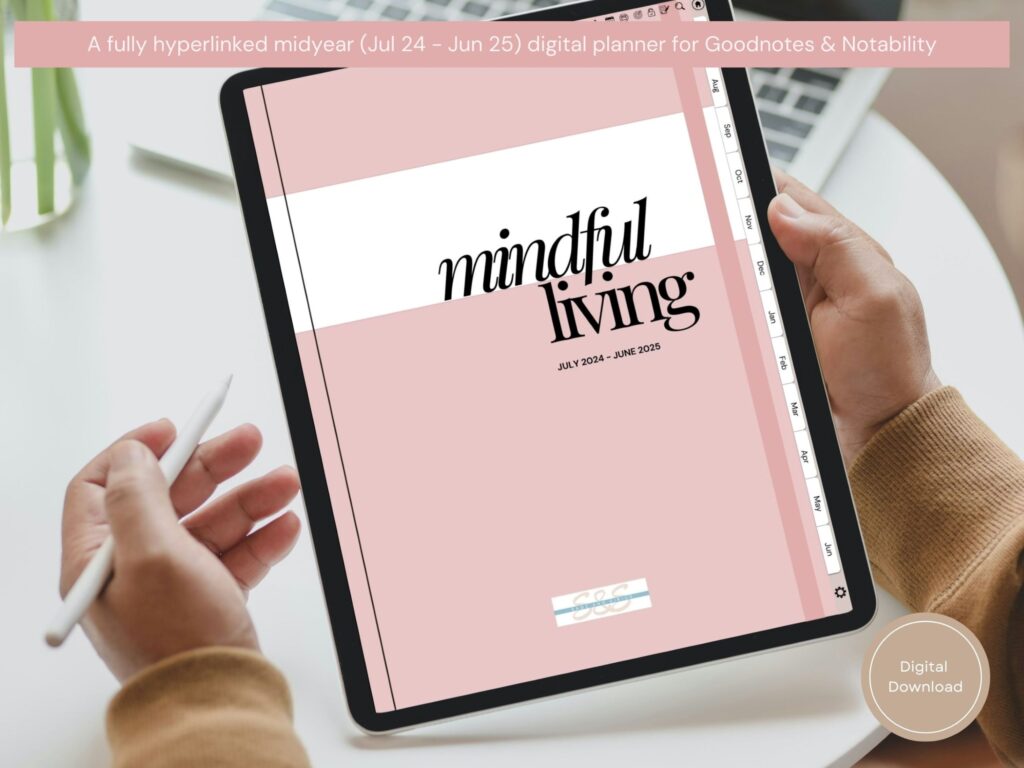
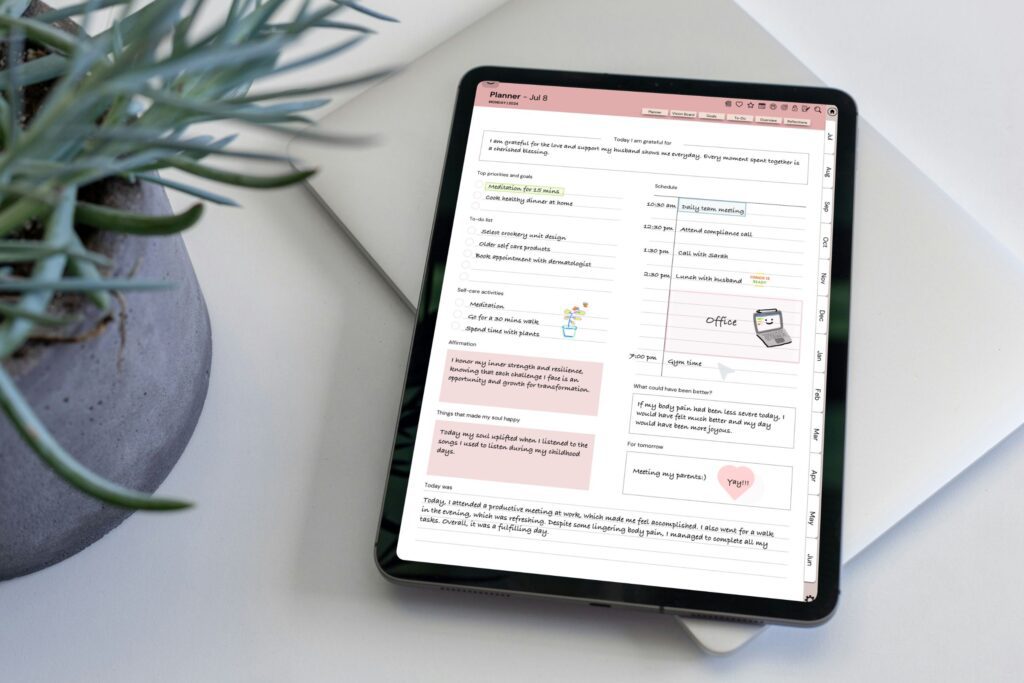
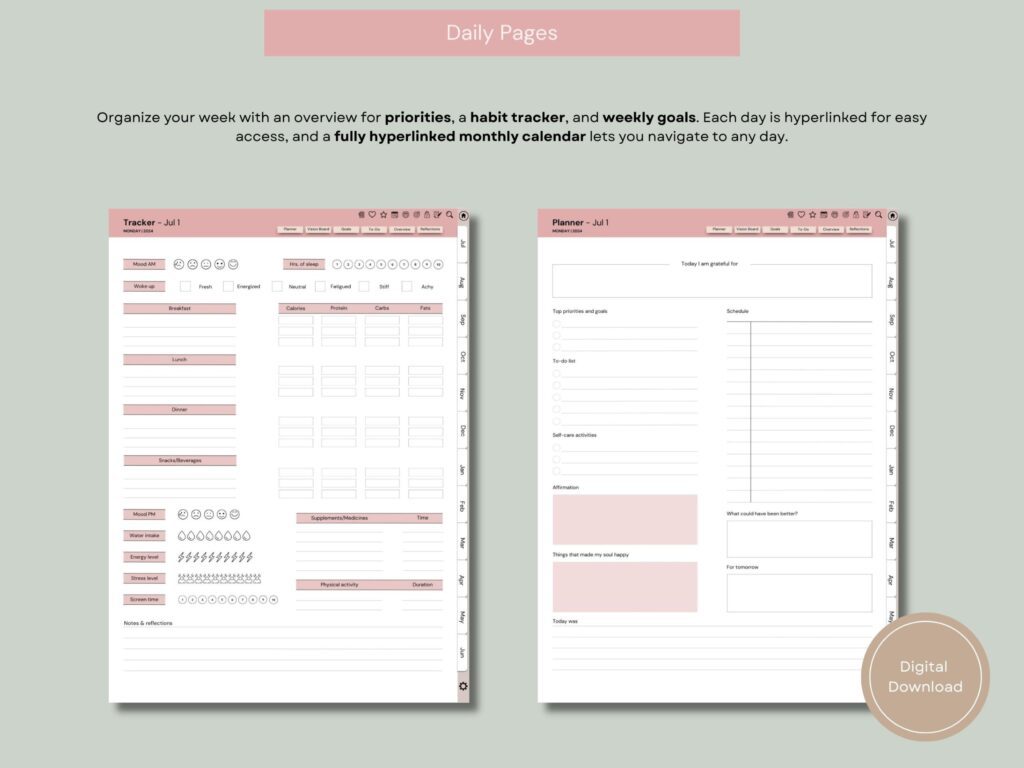
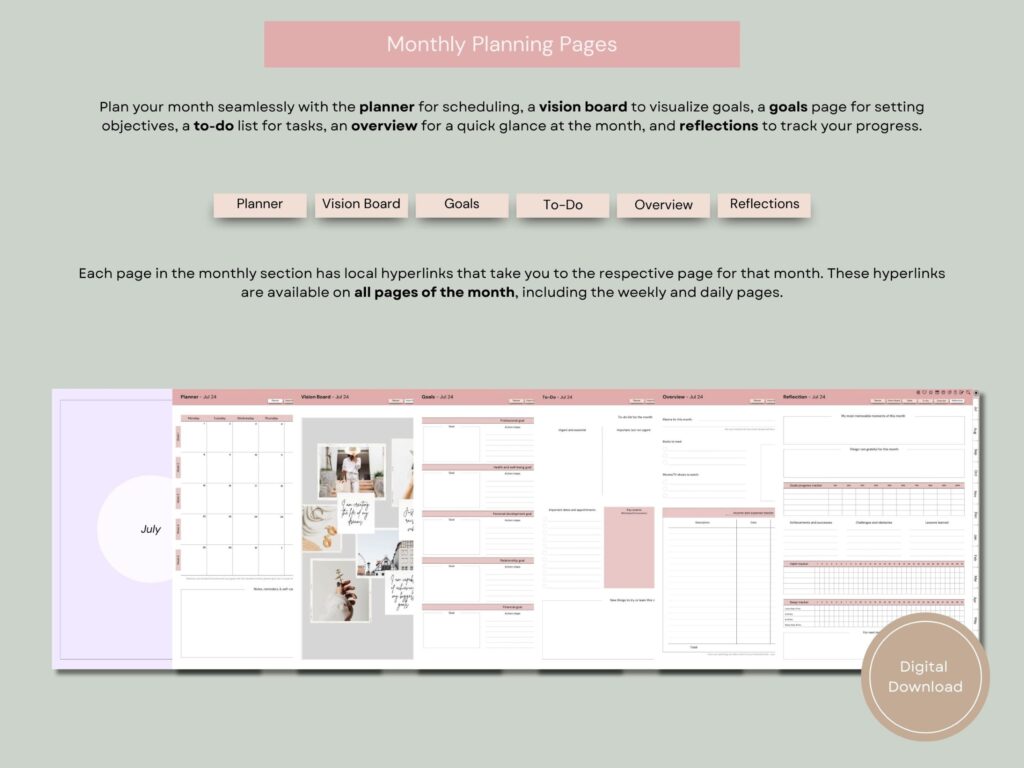
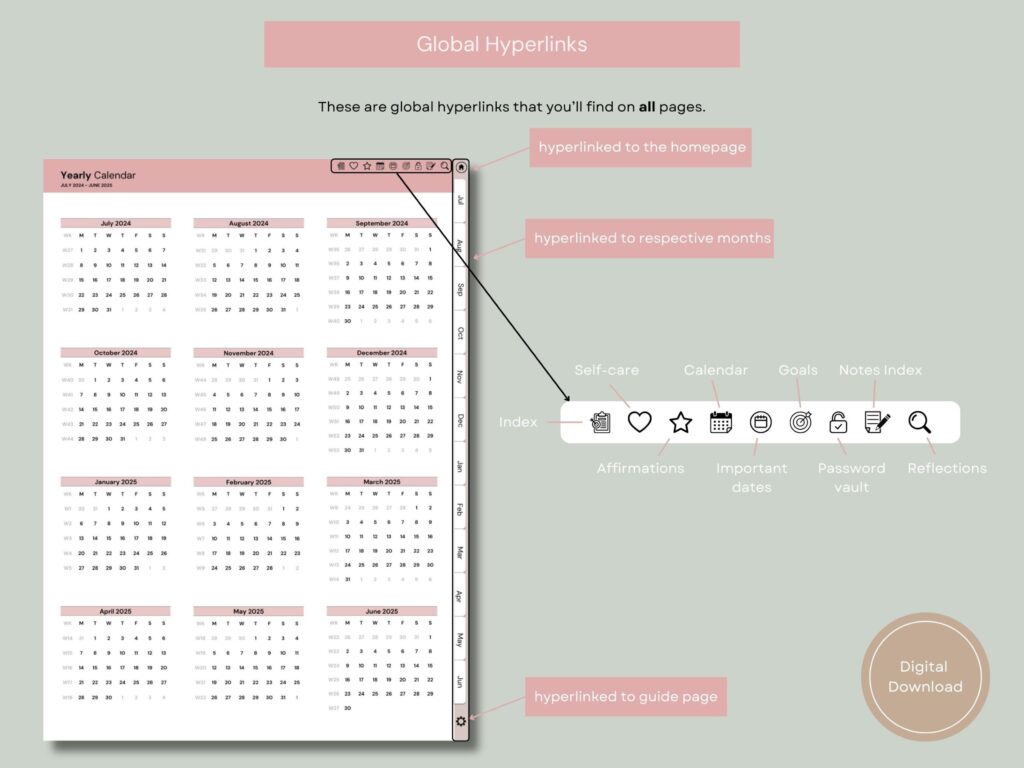
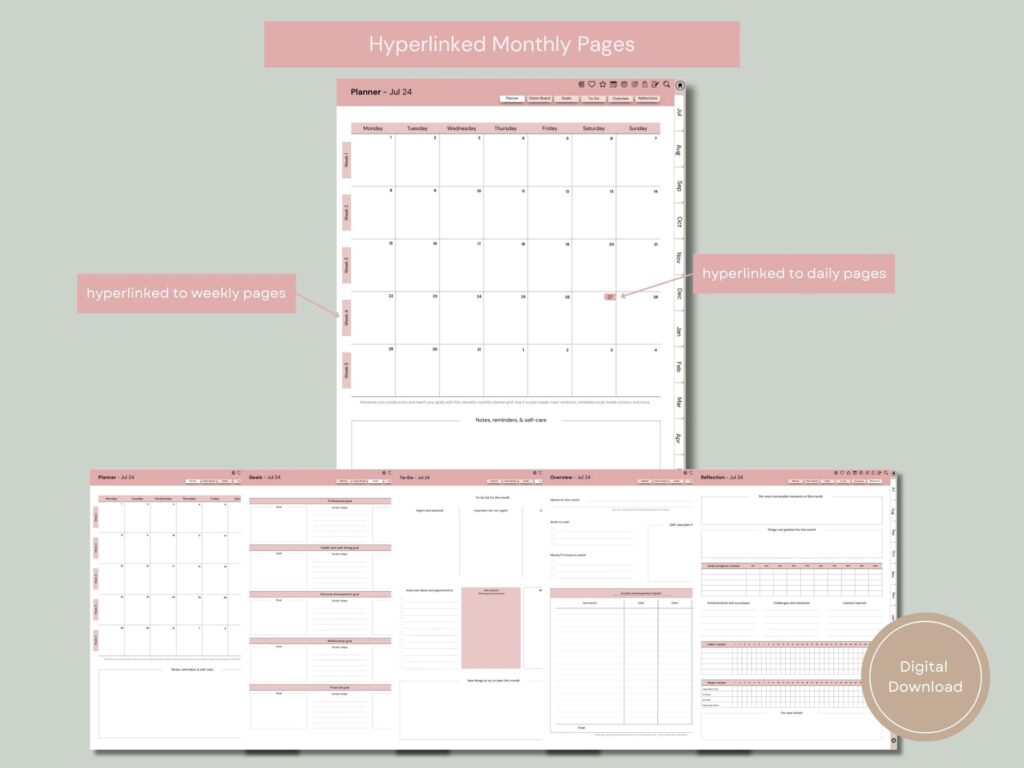
If you’ve been curious about trying a digital journal, this might be the perfect way to start. It’s practical, easy to use, and designed to support your personal growth, mindfulness, and manifestation journey without feeling overwhelmed.
Why not give it a try? You might just find that it’s the perfect fit for your journaling routine!
Exploring Meditation and Journaling Together
In this section, we’re going to explore some of the common questions you might have about using meditation and journaling together.
Both are great practices for self-reflection, but figuring out how they work as a pair can raise a few questions.
Should one come before the other? Do they enhance each other, or are they better kept separate? And how do they fit into a busy daily routine?
Let’s take a look.
Is Journaling a Good Practice Along With Meditation, or Can It Have an Opposite Effect?
Both Journaling and meditation are incredible tools for self-awareness and emotional growth, so it’s no surprise that people often wonder if they work well together, or if combining them might backfire.
The truth is that journaling can be an excellent practice alongside meditation, but like anything, how you approach it makes all the difference.
When paired thoughtfully, these two practices complement each other beautifully. Meditation helps calm your mind and bring awareness to your thoughts and feelings, while journaling provides a way to explore and process those insights.
For instance, after meditating, you might jot down what came up—whether it’s emotions, ideas, or patterns you noticed. This can help you understand yourself better and track your growth over time.
However, if journaling becomes overly analytical or judgmental, it could work against the calming and centering effects of meditation.
For example, if you use your journal to overthink, criticize yourself, or dwell on problems without resolution, it might stir up unnecessary stress.
Rather than treating journaling as a task or a negative outlet, approach it with curiosity and self-compassion.
It’s also important to find a rhythm that works for you. Some people prefer to meditate first to clear their mind, then journal to capture any reflections.
Others like to journal first to unload their thoughts, then meditate to let them go. Experiment with the order and see what feels most natural.
So, journaling is a great companion to meditation when used intentionally.
Just remember to keep both practices gentle and supportive, so they uplift you rather than adding unnecessary pressure.
In What Order Should One Meditate, Journal, and Do Yoga in One’s Daily Morning Routine?
If your morning routine includes meditation, journaling, and yoga, kudos to you for taking care and prioritizing your health and well-being.
But a common question you might have is: What’s the best order to practice them? Well, it’s totally up to you. The order you choose can depend on your goals and what feels most natural for your body and mind.
A popular approach is to start with yoga as it gently wakes up your body and energizes you for the day ahead.
Stretching and moving first thing in the morning can help release any stiffness from sleep, improve circulation, and prepare your mind for the next steps in your routine.
Yoga also acts as a great bridge between sleep and meditation as it helps you transition into a calmer state.
After yoga, meditation is a natural next step. Your body is already relaxed and your mind is more prepared to focus inward.
Meditation after yoga can deepen your sense of presence and help you set a clear and positive intention for the day. Even five to ten minutes of mindfulness or deep breathing can make a difference.
Journaling often works best as the final step. Once you’ve moved and meditated, your thoughts are likely to be more organized, and any ideas or emotions that surfaced during those practices can flow onto the page.
Ultimately, the best order is the one that resonates with you. Try experimenting with different arrangements.
Should I Focus on Perfecting Meditation or Journaling First, and How Do I Get Started With Either?
You don’t need to focus on perfecting either meditation or journaling because the truth is, there’s no such thing as doing them “perfectly.”
Both practices are deeply personal and are meant to evolve with you over time. Instead of worrying about getting it right, the best thing you can do is simply start.
When it comes to meditation, start small. Even two to five minutes of mindful breathing or guided meditation can make a difference.
The goal isn’t to clear your mind completely (which is a common misconception) but to become more aware of your thoughts and let them pass without judgment.
Over time, as you practice regularly, you’ll find it easier to settle into the moment and deepen your meditation.
For journaling, the same principle applies. Don’t overthink what to write or how to structure it.
Begin with whatever feels natural, maybe a reflection on your day, a list of things you’re grateful for, or even a brain dump of thoughts and feelings.
You don’t need fancy prompts or elaborate techniques to get started. The act of writing itself is what’s most valuable, and your style will develop naturally as you go.
If you’re torn between which to prioritize, think about what you need most in this season of your life. Meditation might feel more rewarding initially if you’re seeking calm and clarity.
Journaling could be the better choice if you’re looking for self-expression and a way to process emotions.
Remember, you don’t have to choose one over the other. Both can coexist beautifully, and you can alternate or even combine them in your routine.
So let go of the pressure to be perfect and focus on creating a consistent habit. Growth will follow naturally.
Do Meditations and Writing a Journal Improve One’s Patience?
Meditation and journaling are both known for their calming effects, but can they actually help improve patience?
The answer is yes, both practices have the potential to make you more patient, though they do so in slightly different ways.
Meditation, for instance, trains you to sit with your thoughts and emotions without reacting impulsively.
Whether it’s focusing on your breath, observing your feelings, or practicing guided mindfulness, meditation encourages you to slow down and be present.
Over time, this habit rewires your brain to handle stress and frustration more efficiently.
When you’re patient with yourself during meditation even when your mind wanders or you feel restless, you gradually build the capacity to extend that same patience to others and challenging situations in daily life.
Journaling, on the other hand, helps you develop patience by giving you a space to pause, reflect, and process your thoughts.
In today’s fast-paced world, taking even ten minutes to sit down and write can feel like a deliberate act of slowing down.
As you journal, you might notice patterns in your emotions or triggers that test your patience. This process helps you to approach similar situations with more understanding and less haste.
Writing can also be a reminder to be kinder to yourself, especially when you recognize how much progress you’ve made over time.
Together, meditation and journaling create a powerful combination. Meditation calms your reactive tendencies while journaling helps you understand them.
Both practices help you develop mindfulness and self-awareness, and give you the ability to pause before reacting. All these qualities are very important for developing patience.
So, yes, meditation and journaling can absolutely improve your patience.
The more consistently you practice, the more you’ll notice subtle changes in how you respond to life’s ups and downs with a little more calm and a lot more grace.
How Are Meditation and Journaling Different?
Meditation and journaling are both great tools for self-reflection and mindfulness, but they’re quite different in how they work and what they offer. Knowing these differences can help you figure out how each fits into your routine.
Meditation is all about turning inward. You focus on your breath, a mantra, or just the present moment. It’s about quieting your mind and letting thoughts come and go without holding on to them.
Meditation doesn’t require anything except yourself and a few minutes of stillness. Its purpose is to create a sense of calm and help you stay grounded, even when life gets chaotic.
Journaling, on the other hand, is an active practice. Instead of letting thoughts pass by, you’re putting them down on paper. It’s a way to organize your emotions, reflect on your day, or just get things off your chest.
Journaling leaves you with something tangible, a record you can look back on to see how far you’ve come or what patterns keep showing up in your life.
In short, meditation is about being, just existing in the moment, while journaling is about doing and using words to make sense of your thoughts and feelings. Both are valuable in their own way.
Interestingly, they can also complement each other as we discussed in earlier sections. Meditation helps clear your head, making it easier to write with focus and intention.
And journaling can help you work through things that might come up during meditation. Together, they’re like two sides of the same coin, both helping you connect with yourself, but in very different ways.
There’s no right or wrong practice here. It’s just about what you need in the moment, stillness or expression, or maybe a little of both.
Wrapping Up – Should You Write Before or After Meditation?
We live in a world that’s constantly racing forward. Every day brings something new to adapt to, whether it’s technology, work demands, or life’s endless to-do lists.
In trying to keep up with this pace, so many of us neglect the one thing that matters most, our mental health and well-being.
If we want to thrive and not just survive in today’s fast-moving world, we need to create space in our everyday lives for practices that can ground and balance us, that can keep us sane, and nurture our mind, body, and soul.
Journaling and meditation are two such practices that offer unique ways to reconnect with ourselves, reduce stress, and reflect on the life we’re living.
It doesn’t really matter if you choose to meditate first or start with journaling. What matters is that you give yourself those moments of intention every day.
It’s not about being perfect or rigid in your routine. It’s about showing up for yourself, even if it’s just for a few minutes.
At first, it might feel like nothing’s changing. You might wonder if it’s even worth the effort. But stick with it. Over time, you’ll start to notice little shifts – feeling calmer, more in control, and even more hopeful.
So, take that first step. Write down your thoughts, or sit in silence and breathe. Let it be messy. Let it be imperfect. But let it be yours.
In a world that’s always asking us to do more, give yourself the gift of simply being.
Journaling and meditation aren’t just practices, they’re acts of self-care. They are the reminders that your inner world deserves as much attention as everything happening around you.
And in that quiet space, you’ll find clarity, strength, and peace that no rush or chaos can take away. Namaste!
Related Blogs on Journaling
- What Is Journaling and What Are Its Benefits?
- What Are The Different Types of Journaling
- 5 Simple Steps to Start Journaling for Mental Health
- How and Why You Should Start a Gratitude Journal
- How to Journal for Personal Growth and Self-improvement
- How to Start a Health and Wellness Journal
- How Can Journaling Boost Your Productivity
- How to Journal for Overthinking
- What Is a Morning Journal and How to Journal in the Morning?
- Journaling vs. Keeping a Diary: What’s the Difference?
- The Pros and Cons of Journaling
- What Type of Self Care Is Journaling?
- How to Organize a Personal Journal
- How to Manifest Through Journaling
FAQs – Is It Better to Journal First and Then Meditate?
Which to Do First, Journal or Meditate?
It really depends on what feels natural to you. Journaling before meditation can help clear your mind of clutter, making it easier to focus.
On the other hand, meditating first can help you tap into deeper thoughts and emotions, which you can explore in your journal afterward. Try both and see what works best for your routine.
Should Beginners Keep a Meditation Journal?
Absolutely! Starting a meditation journal can be incredibly helpful for beginners. It’s a simple way to reflect on your sessions and notice patterns or progress over time.
You can write about how you felt, what worked, or even any challenges you faced. This helps you stay consistent and deepen your practice.
Is Writing a Journal More Beneficial Than Meditation?
Journaling and meditation each offer unique benefits, so it’s not about one being “better” than the other. Meditation helps you calm your mind and be present, while journaling lets you express and process your thoughts.
Together, they complement each other beautifully, as we’ve discussed in the blog.
Is Writing a Journal Considered Mindfulness Meditation?
Not quite, but journaling can certainly be a mindful practice. Mindfulness meditation focuses on being fully present in the moment, while journaling involves exploring your thoughts and emotions.
Both practices encourage self-awareness and inner clarity, making them wonderful tools to use together.
Should I Journal Immediately After Meditating, or Can I Wait?
You can do either! Journaling right after meditation helps capture fresh insights or emotions, but waiting until later can give you more time to reflect.
As we mentioned in the blog, there’s no strict rule—it’s all about what fits your rhythm and intentions.
Which is Better, Meditation Before Reading or Meditation After Reading?
Meditating before reading can calm your mind and improve focus, helping you absorb what you’re reading more effectively.
Meditating after reading, however, allows you to reflect on what you’ve learned. Both are beneficial, so try both and decide based on your goals and preferences.







Leave a Reply